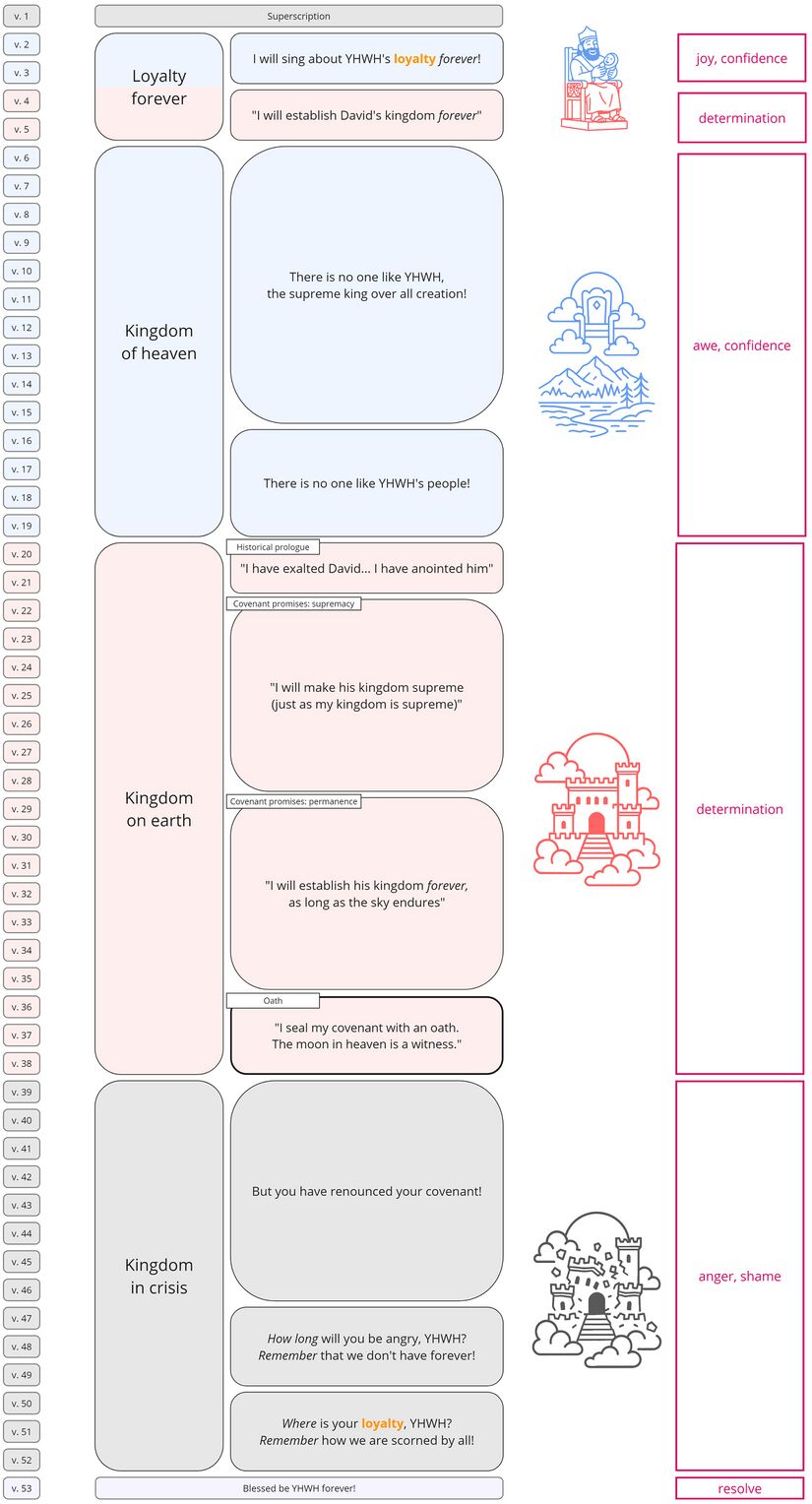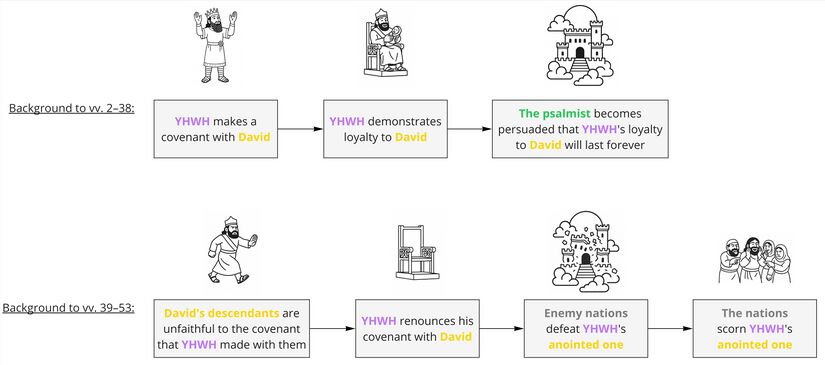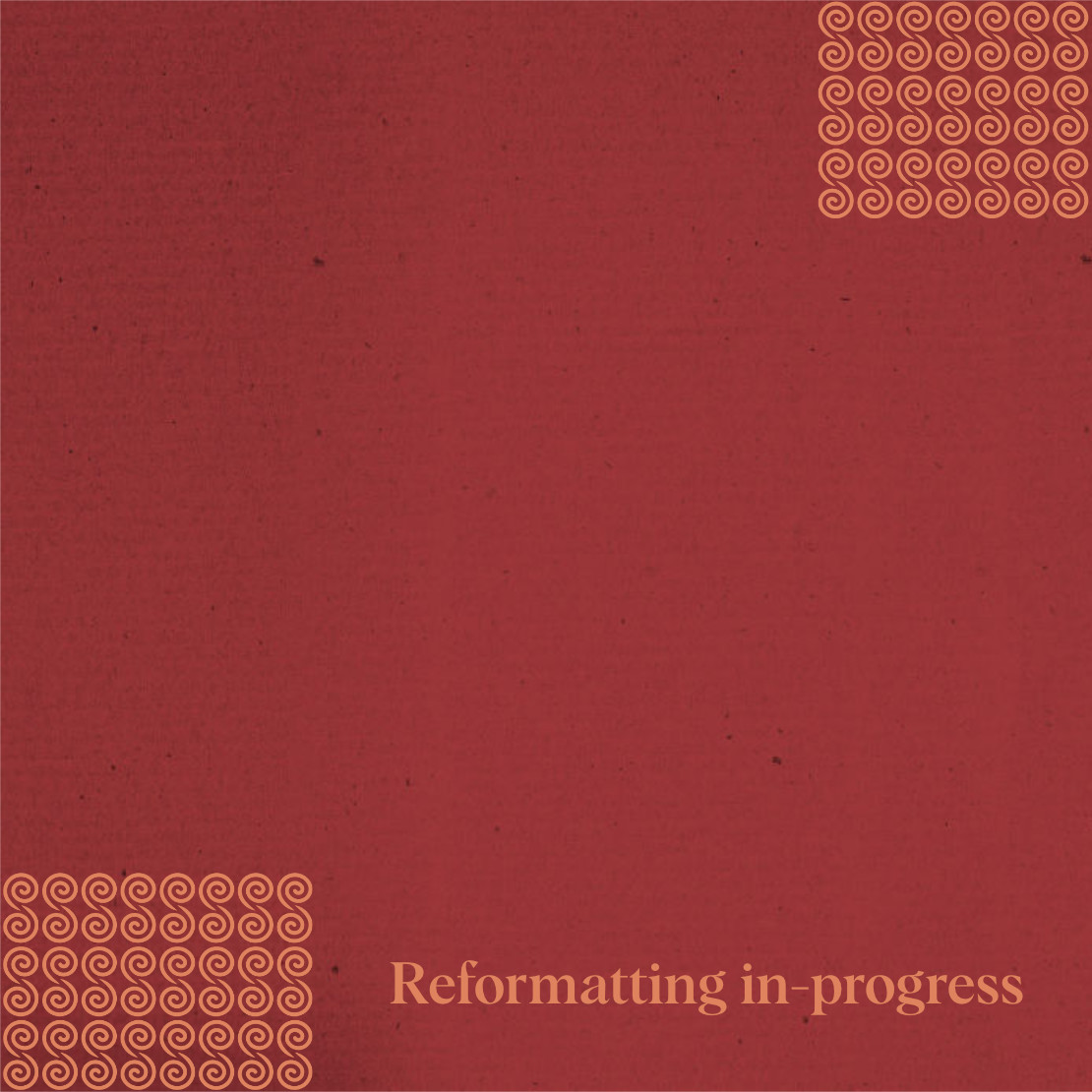Psalm 89 Overview
Welcome to the Overview of Psalm 89
This page will introduce and provide orientation to Psalm 89 as a whole. It includes the following sections:
Introduction to Psalm 89
Author
- Ethan the Ezrahite For details, see The Identity of Ethan the Ezrahite in Psalm89:1.
Book
- Book 3 of the Psalter (Chapters 73-89)
Purpose The Purpose was the psalmist's probable intent or reason for writing this psalm.
To celebrate YHWH's covenant with David (vv. 1–38) and to lament its seeming failure (vv. 39–53)
Content The Content is a concise summary of the whole psalm's content.
YHWH has made unconditional promises to David, to give him a kingdom that is supreme and unending (vv. 4-5, 20-38) and YHWH's promise to establish David's kingdom is firmly grounded in YHWH's own kingdom, which is supreme and unending (vv. 6-19). Therefore, YHWH's loyalty to David is sure to last forever (vv. 2-3)! But, somehow, YHWH's loyalty seems to have failed... (vv. 39-53).
Message The Message is the main idea the psalmist probably wanted the audience to remember upon or after hearing the psalm.
If YHWH's promises to David are unconditional, then why has David's kingdom fallen?
Psalm 89 At-a-Glance
These sections divide the content of the psalm into digestible pieces , and are determined based on information from many of our layers, including Semantics, Poetics, and Discourse. The columns, left to right, contain: the verse numbers; the main title of the section; a brief summary of the content of that section (quote marks indicate the text is taken directly from the English text of the psalm (as per our Close-but-Clear translation); and an icon to visually represent and remember the content.

Background Orientation for Psalm 89
Following are the common-ground assumptionsCommon-ground assumptions include information shared by the speaker and hearers. In our analysis, we mainly use this category for Biblical/Ancient Near Eastern background. which are the most helpful for making sense of the psalm.
- A covenant is "an enduring agreement which defines a relationship between two parties involving a solemn, binding obligation(s) specified on the part of at least one of the parties toward the other, made by oath under threat of divine curse...."[1] Covenant relationships are based on loyalty and reliability.
- YHWH made a covenant with David, promising to establish his kingdom and give him an unending dynasty: "The Lord declares to you that the Lord will make you a house. When your days are fulfilled and you lie down with your fathers, I will raise up your offspring after you, who shall come from your body, and I will establish his kingdom. He shall build a house for my name, and I will establish the throne of his kingdom forever. I will be to him a father, and he shall be to me a son. When he commits iniquity, I will discipline him with the rod of men, with the stripes of the sons of men, but my steadfast love will not depart from him, as I took it from Saul, whom I put away from before you. And your house and your kingdom shall be made sure forever before me. Your throne shall be established forever" (2 Sam 7:11–16, ESV)
- YHWH also made an eternal, unconditional covenant with creation, promising that day and night (and, therefore, sun and moon) would never cease (see Gen 8:21–22). The same loyalty and reliability that uphold YHWH's covenant with creation also uphold YHWH's covenant with David. Therefore, "If you can break my covenant with the day and my covenant with the night, so that day and night will not come at their appointed time, then also my covenant with David my servant may be broken, so that he shall not have a son to reign on his throne" (Jer 33:20–21, ESV).
Background Situation for Psalm 89
The background situation is the series of events leading up to the time in which the psalm is spoken. These are taken from the story triangle – whatever lies to the left of the star icon.

Participants in Psalm 89
There are 6 participants/characters in Psalm 89:
Profile List
| Ethan the Ezrahite |
| "Ethan the Ezrahite" (v. 1) |
| Israel |
| "the people" (vv. 16, 20) |
| "those who know the signal" (v. 16) |
| "YHWH's servants" (v. 51) |
| Prophets |
| "YHWH's loyal ones" (v. 20) |
| YHWH |
| "YHWH" (vv. 2, 6, 7, 9, 16, 19, 47, 52, 53) |
| "YHWH, God of armies" (v. 9) |
| "Mighty Yah" (v. 9) |
| "The holy one of Israel" (v. 19) |
| "The king's father, god, and the rock who saves him" (v. 27) |
| "Lord" (vv. 58, 50, 51) |
| David |
| "David" (vv. 4, 21, 36, 50) |
| "YHWH's servant" (vv. 4, 21) |
| "YHWH's chosen one" (vv. 4, 20) |
| "warrior" (v. 20) |
| "The firstborn, the highest of the kings of the earth" (v. 28) |
| David's descendant(s) |
| "David's descendants" (lit: "seed") (vv. 5, 30, 37) |
| "Israel's king" (v. 19) |
| "David's descendants" (lit: "sons") (v. 31) |
| "YHWH's anointed one" (vv. 39, 52) |
| "YHWH's servant" (v. 40) |
| Enemies |
| "Enemy" (v. 23) |
| "Unjust person" (v. 23) |
| "David's adversaries" (v. 24) |
| "Those who are hostile to David" (v. 24) |
| "All who pass by" (v. 42) |
| "The king's neighbors" (v. 42) |
| "The king's enemies" (v. 43) |
| "The king's adversaries" (v. 43) |
| "The nations" (v. 51) |
| "YHWH's enemies" (v. 52) |
| The Sea |
| "The sea" (vv. 10, 26) |
| "The sea's waves" (v. 10) |
| "The currents" (v. 26) |
| "Rahab" (the sea monster) (v. 11) |
| "YHWH's enemies" (v. 11) |
| Divine beings |
| "The sky" (v. 6) |
| "Holy ones" (vv. 6, 8) |
| "Divine beings" (v. 7) |
| "Everyone around YHWH" (v. 8) |
| "Tabor and Hermon" (v. 13) |
| Humanity |
| "People" (v. 48) |
| "Person" (v. 49) |
Profile Notes
- Ethan was a Levite, a contemporary of King David, whom David put in charge of early temple music, together with Asaph and Heman (1 Chr 6:16-32; 15:16-19). He was an "Ezrahite" in the sense that he was associated with the Judahite family of Zerah (cf. 1 Chr 2:6), not as a biological descendant, but as a sojourner (cf. Judg 17:7; 1 Sam 1:1). In addition to being a leader of worship, he was also renowned for his wisdom (cf. 1 Kgs 5:10-11). See further: The Identity of Ethan the Ezrahite in Psalm89:1.
- YHWH's heavenly court consists of lesser divine beings (cf. 1 Kgs 22:19; Job 1:6; 2:1; 38:7; Ps 82). These heavenly creatures surround YHWH's throne (see v. 8b) and worship him (v. 6; cf. Ps 29). In terms of power and majesty, they do not even compare to YHWH (see vv. 7–8).
- ↑ Gentry and Wellum 2012, 132, adapted from Lane 2000, 314.
